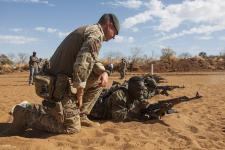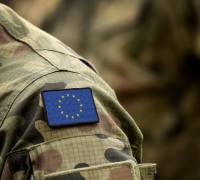EU vs Wagner paramilitaries: a view from the ground in Mali

The retired university professor looks at me with a mischievous look from his seat on the couch behind the glass table as he delivers his message: "Mali needs Russia to help us out of the crisis". He is co-founder of a group, which calls itself Patriots of Mali, with close links to the country's military government.
I am in Mali doing fieldwork to investigate how the country's population perceives the European security forces that have been trying to fight militant jihadism in the country for more than a decade.
One of the questions I am trying to find answers to is why Mali has turned its back on Europe to instead cooperate with Russia and the infamous Russian paramilitary organisation Wagner.
My two Malian research colleagues and I visit the professor in his house on the outskirts of the capital, Bamako. We have mapped the pro-Russian networks that support the military regime, and via contacts at the university we have reached the professor.
He has agreed to explain the hitherto untold process that back in 2017 convinced Russia to enter into military cooperation with Mali in the fight against terror. A cooperation that Europe's leaders see as incomprehensible and unacceptable — especially after the war in Ukraine has increased the geopolitical rivalry between the great powers.
EU member states have for the past 10 years sent military operations, border controls and large sums of aid to the region to prevent irregular migration, terror and organised crime from reaching Europe. But now France and the European military force, Takuba, have been kicked out of Mali, and the transitional military government has chosen to cooperate with Russia instead.
Often, the explanation is that Russia is gaining influence through a major regional disinformation campaign. But this simplistic analysis and massive focus on the Wagner group overlooks the strong pan-African activist forces behind the decision to cooperate with Russia.
What do Mali's pro-Russian civil society actors themselves say? What drives the choice to invite Russia in? Only by understanding their motives and the nuances of the war and its many parties can we in Europe avoid escalation and learn from our missteps.
And it is necessary, because an escalated great power rivalry in Africa could have consequences for Europe's ability to deal with security problems in a strategically important region, which is increasingly producing enemy images of Europe's interests in the region.
Eyes wide open
First and above all, it is clear that African leaders and civil society actors are far from passive recipients of Russian propaganda and disinformation. This insight permeates my entire fieldwork, but it is directly expressed in the living room here at Mali's patriots, where the retired professor states that cooperation with Russia takes place with eyes wide open and is rooted in a feeling that France, the old colonial power, has betrayed Mali in recent years: "France has held its hand under corrupt regimes to nurture its own interests, while Mali succumbed to terror", according to his analysis.
Therefore, the patriots also support the country's new military rulers, who, after taking power for the second time in August 2021, boosted cooperation with Russia and the controversial Wagner group.
The patriots belong to the political elite close to the centre of power in Bamako, and several of them have close connections to Russia dating back to the Soviet era.
Back in 2016 and 2017 the patriots held an opinion poll that showed that approximately 80 percent of the voting population wanted cooperation with Russia. With that opinion poll in hand, they went to the Russian embassy and started the meetings that paved the way for Russian-Malian military cooperation.
Outside the house, there are divided opinions about the effect of the Russian-Malian partnership. Those who support the transitional government claim that for the first time the army is on the offensive and not just pushed on the defensive by jihadists.
More critical voices say that the army and the Wagner Group, in collaboration with local militias, are acting so harshly against the civilian population that it increases recruitment for the jihadist groups, which have moved closer to the capital than ever before.
Since 2011, the European security policy engagement has revolved around ensuring that the regional threats such as terror, irregular migration and organised crime do not become security problems for Europeans further north. But if that project is to succeed, we need to understand our own role in the wars we participate in, how the policies we pursue are perceived, and why in this case it is being turned against us.
Rather than escalating a diplomatic crisis, a start could be to familiarise ourselves with what drives central actors, even if it disturbs our worldview and our self-understanding as bearers of noble democratic values.
Cooperation with Russia could cost Mali dearly if the security situation continues to deteriorate and Russia proves unable to make the difference in the fight against terror that the patriots hope for. Europe is now looking to neighbouring Niger to find a promising host nation for its forces.
But without understanding what went wrong in Mali, the chances of success in the country next door are limited.
DIIS Experts


